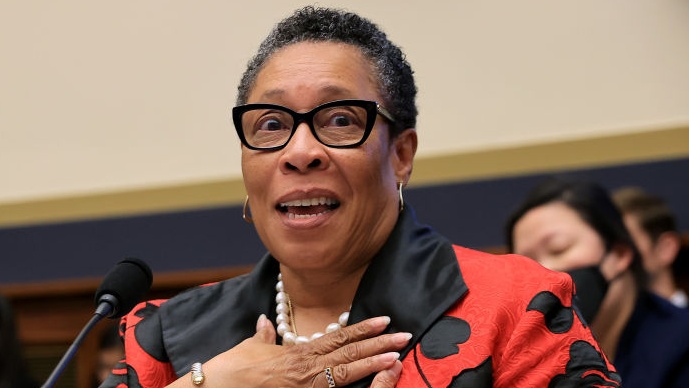Back in March, U.S. Secretary of Housing and Urban Development (HUD) Marcia Fudge struck a familiar chord with anyone who grew up in a Black household.
The White House official greeted a room of reporters at a press conference. Upon hearing crickets, she tapped her ear and repeated "good afternoon," appearing fully non-intent on proceeding with the day's briefing until this common courtesy was seen through. The moment led to cackles both in the room and around the nation.
But Fudge has done far more than gently remind a room of White House reporters to speak when spoken to.
The 68-year-old politician sat down with Blavity last week to discuss HUD’s efforts to tackle the housing crisis and help Black communities through the Biden administration’s Build Back Better (BBB) initiative.
“The Build Back Better agenda is going to help more people of color and more poor people than anything we’ve done in the history of this country,” she promised.
Such a bold declaration comes as the country as a whole, and Black America in particular, faces unprecedented challenges. Secretary Fudge took office in March knowing that she was coming amid a crisis of homelessness and lack of affordable housing.
She noted to Blavity that recent HUD data shows that nearly 600,000 people are homeless in America, with 40% of those being people of color. The economic downturn, nationwide shortage of affordable housing and the end of the eviction moratorium have contributed to “almost a perfect storm” when it comes to the homelessness crisis in the country, she said.
To tackle this problem, Secretary Fudge explained, the Biden administration allocated $10 billion divided between emergency housing vouchers for individuals experiencing homelessness and money for securing permanent housing. The Secretary pointed out that this was in addition to a $46 billion COVID-relief package passed by Congress earlier this year in order to assist renters with back rent, future rent and utilities payments.
Despite the wealth of resources that have been made available, Secretary Fudge said urgency remains an issue:
"The problem we have at least with the emergency rental assistance is states and local governments have not been able to get the money out fast enough.”
To solve that problem, she noted, regulations and programs are coming into place to encourage or require utilization of these funds. For example, in certain states, the courts are preventing landlords from evicting tenants unless they “have actually applied for emergency rental assistance” first.
More broadly, HUD is looking to protect both tenants and landlords hit hard by the economic downturn.
Secretary Fudge explained that “because we know who all the landlords are who get vouchers,” HUD is working to make sure these landlords get backpay.
HUD is working with the Treasury Department and various state and local governments to inform and aid everyone who is eligible to apply for the assistance.
“We just need a little more time to get it to where it needs to be to make sure that we have made contact with everyone who is eligible,” Fudge said, “and that is primarily Black, brown and poor people.”
BBB is also looking to tackle universal access to broadband and high speed internet. During the pandemic, lockdowns and learn-from-home schooling have highlighted the vast racial and economic disparities concerning internet access in the country. Secretary Fudge lamented that countless children have missed out on a year's worth of education due to them not having the resources to engage in virtual learning.
“It breaks my heart,” she added, “because most of these children live in inner cities and rural areas.”
In order to fix these disparities, which existed even before the pandemic, the Biden administration has secured a bipartisan infrastructure plan which seeks to ultimately allow every American to have access to high-speed internet. The White House aide argued that safe housing and the ability to access schooling — online or in person — are fundamental rights. BBB is also prioritizing other initiatives which will expand access to education for Black Americans, including free community colleges and expanded funding for HBCUs.
Secretary Fudge’s history of building bridges across party lines for the greater good dates back to her time in Congress, when she represented the 11th District of Ohio from 2008 until taking the cabinet position this year. Inspired by the president of the Rock & Roll Hall of Fame, which was located in her district, then-Representative Fudge helped start the bipartisan Congressional Rock & Roll Caucus, with politicians from both sides of the aisle having jam sessions.
“Music is the universal language,” Fudge says of her efforts at the time, which also included promoting music education.
Secretary Fudge has been many things in her career: a Congresswoman, a rock & roller, “a loud fan” of Ohio sports. Through it all, she just wants to do good by her people:
“I'm a soldier. And I want to make sure that all of our people know that that my goal is to make the life of people that look like me and you better every day.”

